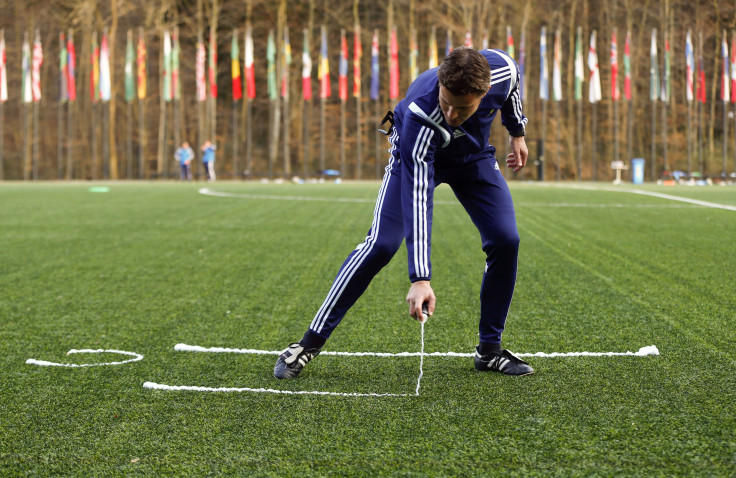'Vanishing' Spray Paint Debuts At 2014 World Cup, Used During Free Kicks

Referees at the 2014 FIFA World Cup are using a “vanishing” spray paint to keep players in line at this year’s event in Brazil.
The spray paint, which evaporates or “vanishes” after about a minute, is used by officials to keep players from creeping too close to the ball on free kicks. Referees carry a can of the substance on the field and use it to paint a white line 9.15 meters, or about 10 yards, away the free kick spot; defenders aren’t allowed to cross the line.
The “vanishing spray” made its first World Cup appearance during Thursday’s opening match between Brazil and Croatia, but it will be used throughout the tournament. It’s already a bit hit amongst Twitter users, many of whom have never seen it used during a match.
Please tell me I'm not the only one with A strange fascination with the magical spray paint the use before free kicks...? #WorldCup14
— Emma (@EmmaBlahh) June 13, 2014There's nothing I hate more than when referees spray paint the line that the wall must stand behind
— Nikki Villiger (@tricky_nikki13) June 13, 2014If only FIFA had spent all that money on training officials in the offside rule and not on fancy disappearing spray paint #WorldCup2014
— Sam Webb (@sjjw1991) June 13, 2014Anybody else getting the impression this new magic spraypaint is somewhat less crucial for referees than compulsory eye tests? #WorldCup
— Mike McCahill (@mike_mccahill) June 13, 2014In May, FIFA President Sepp Blatter explained why the spray paint was approved for use at World Cup matches. "We started using it in all (our) competitions this year and at the World Cup we will definitely keep on the same path,” he said, according to the Associated Press. “For the discipline of the game, it’s good. I was skeptical at first but after talking to referees who used this system, they were all happy with it.”
Over a decade ago, Pablo Silva, an Argentinian journalist and entrepreneur, worked with a group of chemical engineers to invent the spray, Reuters reported. Silva first thought of his invention after a defender in a pick-up game crossed the imaginary 9.15-meter line and blocked his free kick attempt.
''We were losing 1-0 and had a free kick and as I stood over it I knew I could make this left-footed shot and even the game. But when I finally took my shot the ball struck the defender in the stomach as he was just 3 meters away,'' he told the Associated Press. ''I was in a rage and I ran straight to the referee who would eventually show me a red card for protesting. And that's when it came to me.''
The spray was first used during a professional match in 2008, but FIFA only approved its use this year. “We’ve climbed a long, steep curve to get here,” Silva said. “Economically, this will be very important for us but what makes us most proud is that the product will be recognized at an international level. You can’t put a price on that.”
The spray is used by the ref to paint a temporary line 10 yards from the free kick spot, it disappears after a minute pic.twitter.com/18TwZwTtTM
— Jacaranda FM Sport (@Jacasport) June 13, 2014White foam spray is used in #WorldCup for the first time along with the goal line technology. pic.twitter.com/zxJQXchZxE
— Ahmad Qushmaq|قوشماق (@aqushmaq) June 13, 2014Vanishing spray made its #WorldCup debut last night. What other innovations would you like to see in football? #WCT pic.twitter.com/ESogielStm
— Sky Sports Football (@SkyFootball) June 13, 2014© Copyright IBTimes 2025. All rights reserved.






















